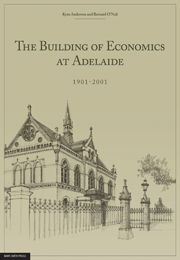Book contents
- Frontmatter
- Contents
- List of charts and tables
- Preface
- A chronology of the building of Economics at Adelaide
- Chapter 1 Birth and adolescence, 1901-1949
- Chapter 2 Growth and adaptation, 1950-2001
- Chapter 3 Prospects for the next century
- References
- Appendix 1 Biographies of staff who became Professors
- Appendix 2 Charts
- Appendix 3 Tables
Chapter 3 - Prospects for the next century
Published online by Cambridge University Press: 05 June 2012
- Frontmatter
- Contents
- List of charts and tables
- Preface
- A chronology of the building of Economics at Adelaide
- Chapter 1 Birth and adolescence, 1901-1949
- Chapter 2 Growth and adaptation, 1950-2001
- Chapter 3 Prospects for the next century
- References
- Appendix 1 Biographies of staff who became Professors
- Appendix 2 Charts
- Appendix 3 Tables
Summary
The Economics discipline at the University of Adelaide has a distinguished 100-year history of which the University and the State of South Australia can be proud. Very few other departments, of any discipline in Australian universities, could claim to have a majority of its lecturer appointments rising to full Professor status over a period as long as 1901 to 1995. Nor would many other university departments be able to say they have had five of their graduates win Rhodes Scholarships in the past 12 years (Table 14). While teaching and research productivity is more difficult to gauge, because changes in quality matter, the growth in the number of graduates per Economics and Commerce lecturer per year has been impressive: from 2.5 in the 1950s and 1960s to 5.0 in the 1980s, 7.5 in the first half of the 1990s, and 12.4 in the six years to 2003.
The period since the Dawkins' reforms to higher education began in the late 1980s has been one of rapid change for Economics at Adelaide, as it has for other departments. One indicator of that is the number of changes (three) in the name and composition of the faculty in which Economics is housed since 1988 (Table 23). Another indicator is the growth in the number of awards available. For over five decades, Economics was provided via just the B.A. and M.A. From 1930 the B.Ec. then served Economics and Commerce for another six decades, supplemented by three professional diplomas until 1952 and by the M.Ec. from 1938, the B.Ec.(Hons) from 1939 and the Ph.D. from 1965.
- Type
- Chapter
- Information
- The Building of Economics at Adelaide , pp. 43 - 45Publisher: The University of Adelaide PressPrint publication year: 2009



